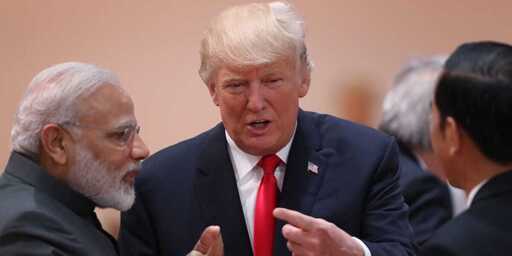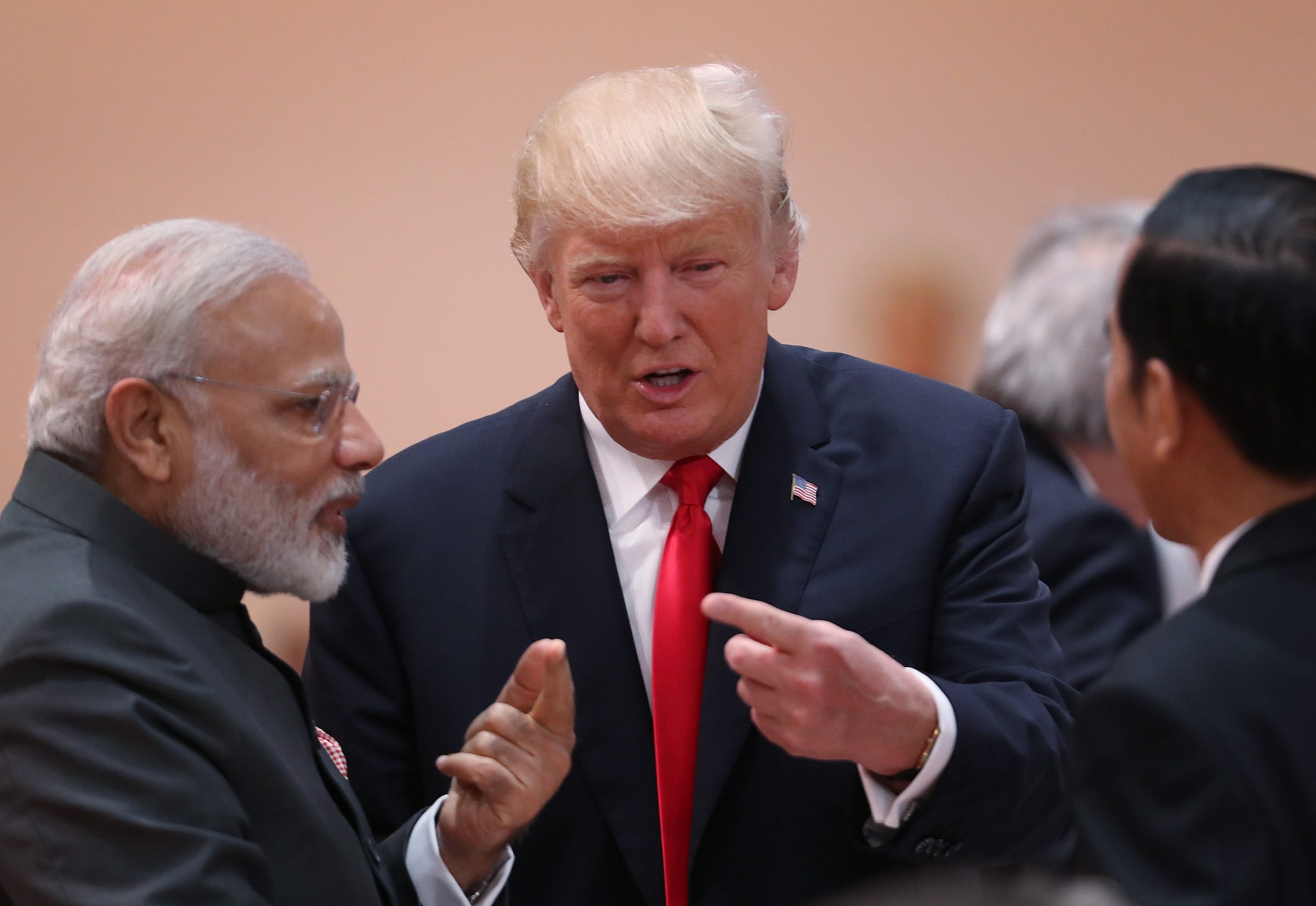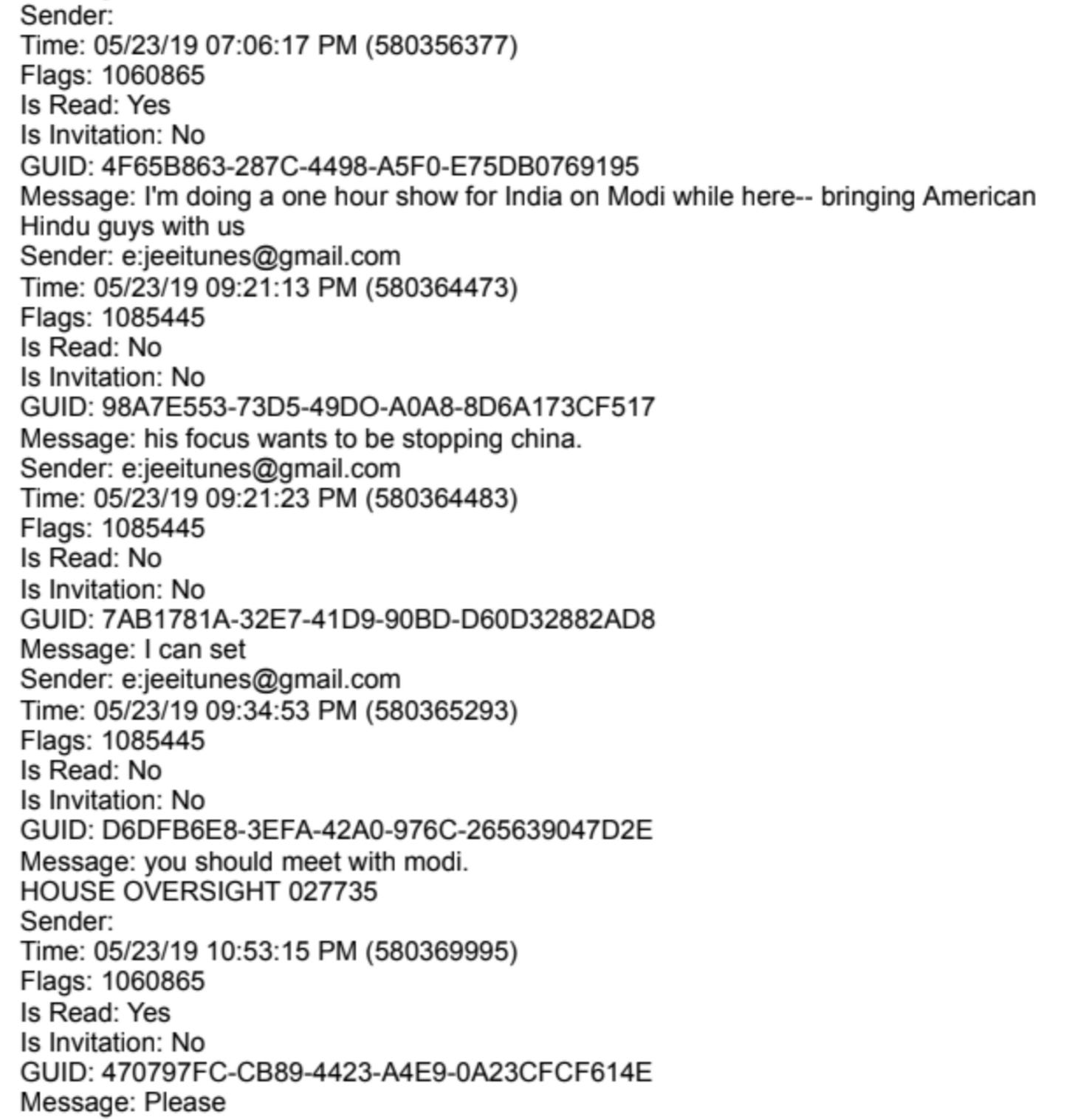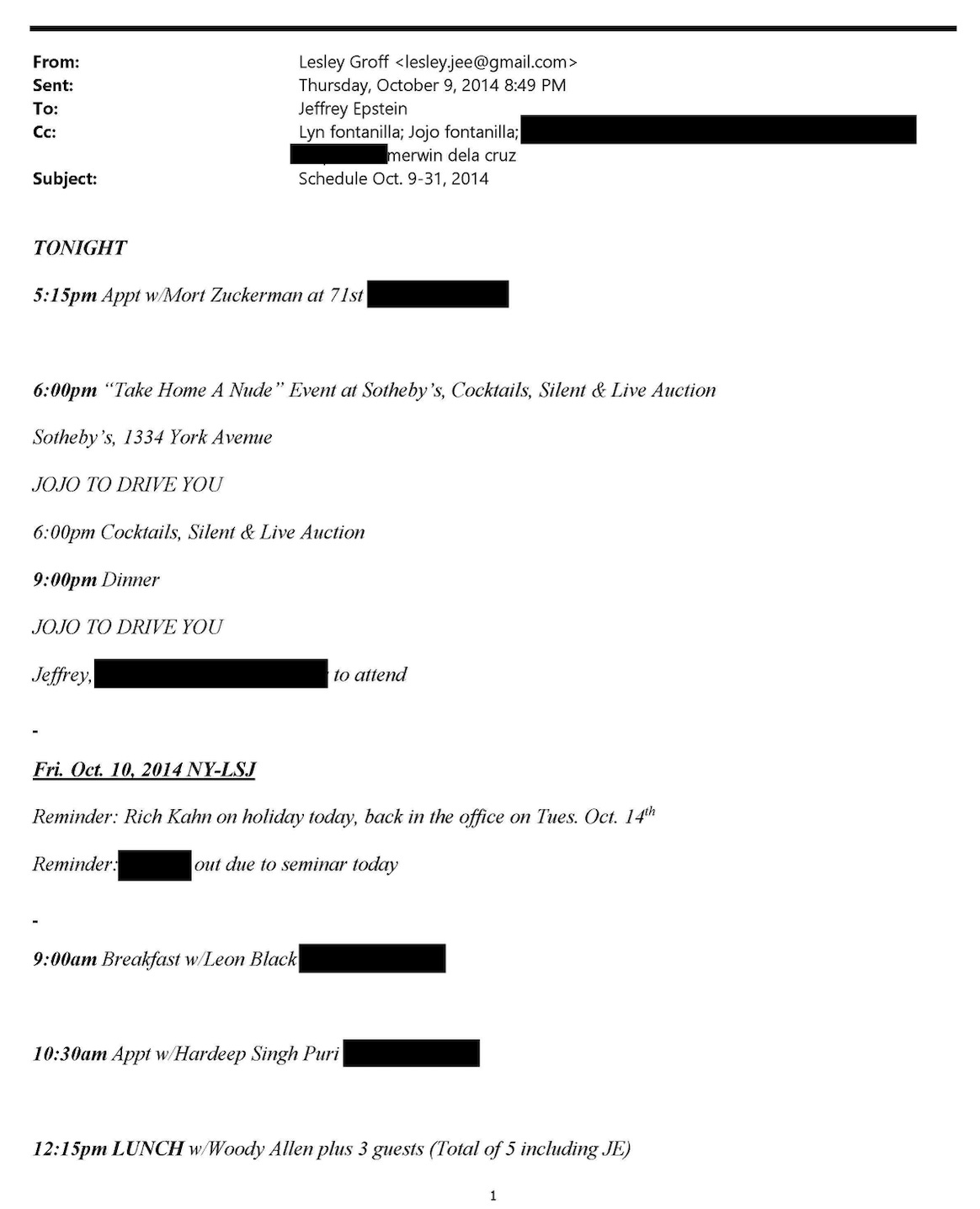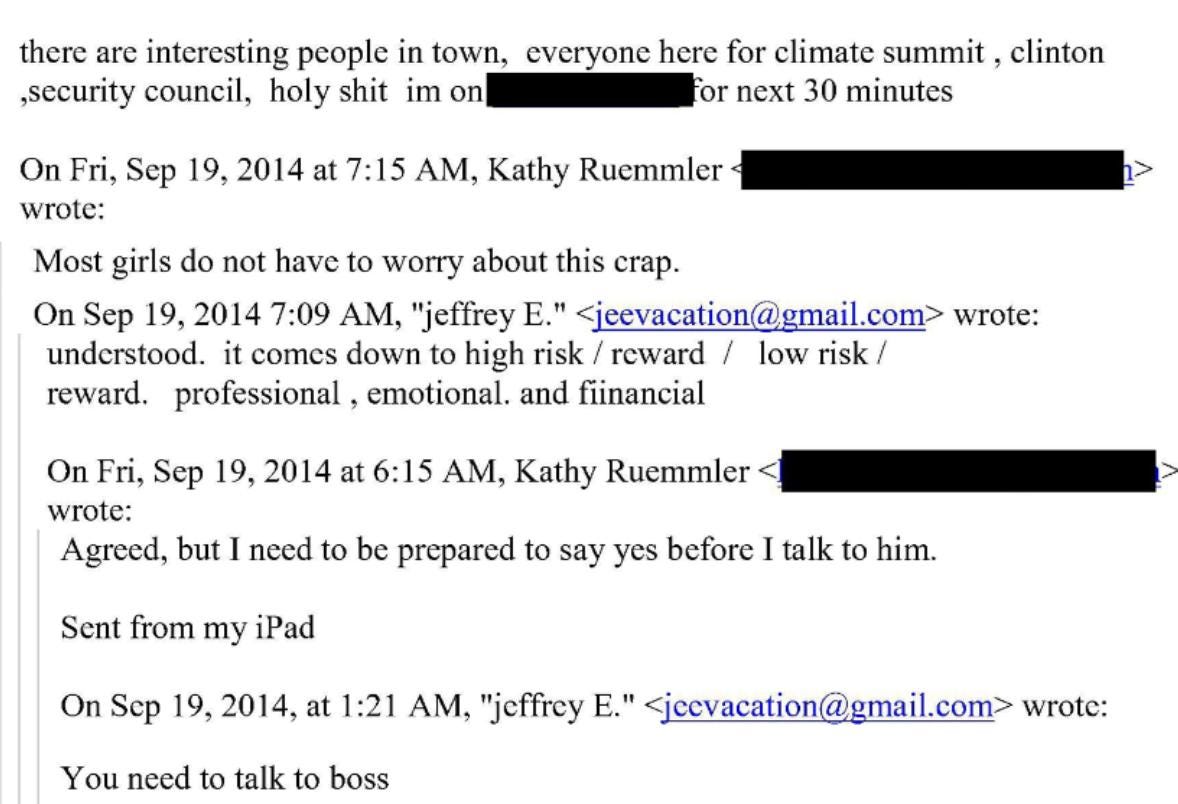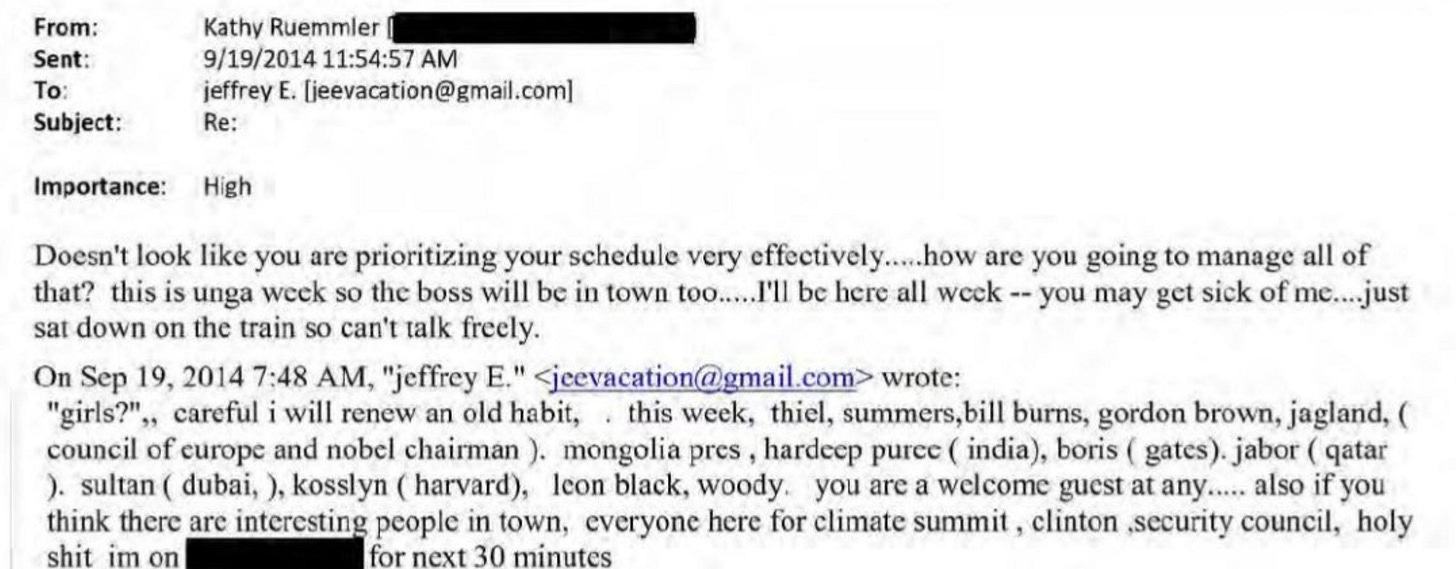Below is the sixth dispatch in our ongoing series—covered here by Pod Save America—exploring the question that has yet to be fully answered: What did Jeffrey Epstein really do? And on whose behalf?
Today’s story, a glance at Epstein’s relationship with the Indian elite, draws on documents recently released by the House Oversight Committee as well as a new tranche of some 18,000 Epstein emails obtained by Drop Site News this week. That correspondence comes from the Yahoo inbox of Epstein; some of the messages were reported on by Bloomberg News, but Bloomberg did not make the full cache public.
The Yahoo emails were provided to Drop Site by the nonprofit whistleblower site Distributed Denial of Secrets, which received a copy. DDOS also obtained the correspondence of former Israeli Prime Minister Ehud Barak. You can support their work here. (We didn’t tell them we’d post their donation link, it’ll be a nice surprise if people come through for them.)
And, of course, if you have yet to upgrade your subscription, now is as good a time as any.
—Ryan Grim
U.S. President Donald Trump chats with Indian Prime Minister Narendra Modi at G20 economic summit on July 8, 2017 in Hamburg, Germany. Photo by Sean Gallup/Getty Images.
Jeffrey Epstein offered to set up a meeting with Indian Prime Minister Narendra Modi and former Trump White House chief strategist Steve Bannon in mid-2019, less than two months before his arrest, according to a review of documents released by the U.S. House Oversight Committee. The documents, which reveal previously unknown details about the depth of Epstein’s relationships with high-profile Indian political and business figures in the years prior to his death, also show Epstein corresponding about the India-Israel relationship with a powerful Indian billionaire who had entered into a joint venture with a state-owned Israeli defense firm.
Epstein had close ties with powerful figures in the Israeli intelligence establishment, and his high-level interactions on India also came at a time when the bilateral relationship between New Delhi and Tel Aviv was beginning to accelerate.
Following official state visits by Modi and Netanyahu in 2017 and 2018, in which the two signed cooperation agreements on cybersecurity, aviation, and energy, in 2019, India signed major arms deals with Tel Aviv to acquire advanced anti-tank and surface-to-air missiles. Today, India, which did not have formal ties with Israel until 1992, is the single largest customer for Israeli arms, with purchases unaffected by the genocide in the Gaza Strip.
Several years before this relationship began to publicly blossom, disclosures of his private calendars show that Epstein had several appointments with Hardeep Singh Puri, a senior leader of Modi’s ruling BJP party. The appointments took place long after the financier had been convicted of sexual offenses, and while he was engaged in other global dealmaking aimed at furthering the interests of the Israeli government and private firms tied to Israel intelligence.
The recipient of Epstein’s messages in 2019 pushing to set up a meeting with Modi is redacted in the House Oversight Committee releases of his communications. But the details match closely with the contemporaneous activities and locations of Steve Bannon. The unidentified person discussing Modi told Epstein that he was in Kazakhstan; Bannon was attending a conference there at the same time. The sender mentions working with “Kobach” and “Kolfage,” and that he is the chairman of an unnamed organization. At the time, Bannon was the chairman of the advisory board of We Build The Wall, a nonprofit that fundraised for a wall at the U.S.-Mexico border, a project he worked on with Kris Kobach and Brian Kolfage. (The project ended with Bannon pleading guilty to fraud.)
Though Bannon had been fired from the White House in 2017, he remained influential in MAGA world, offering advice to Trump on political strategy. Bannon did not respond to a request for comment.
On May 23, 2019, the day Modi won a commanding parliamentary majority and secured re-election as prime minister, Bannon messaged Epstein saying, “I’m doing a one hour show for India on Modi while here-- bringing American Hindu guys with us.” Epstein responded, “his focus wants to be stopping china.” The following week Bannon did an interview with the Indian news outlet WION. In the interview, Bannon discussed Modi extensively—and the importance of a U.S.-India relationship in the context of the U.S.’s economic war with China.
Seeking to facilitate a meeting, Epstein pressed further. “I can set,” Epstein wrote in a text. “you should meet with modi.” Bannon replied, “please.” Epstein followed by asking, “when can you do it?”
At the time, Bannon had been one of the most vocal anti-China voices in conservative politics, calling China “the greatest existential danger” to the U.S. in an interview that May and demanding an escalated trade war to counter Beijing’s global economic ambitions.
The day after his message pushing for contact with Modi, Epstein sent another message to Bannon encouraging him to overcome any obstacles to the meeting. Epstein emphasized what he saw as the strategic importance of the relationship, while highlighting Bannon’s well-known economic concerns about China: “my guy said to tell you that you are missing a great opportunity, look at your underwear. it either says made in china or made in india. . how is it possible that you guys don’t understand shared goals.”
The disclosures by House Oversight do not show any significant intervening correspondence between Bannon and Epstein on the subject. Hours later, Epstein wrote again, stating, “modi on board.”Modi’s office did not respond to Drop Site’s requests for comment.
Texts between Epstein and an individual identified as Steve Bannon. Source: House Oversight Committee.
Epstein died in a jail cell in Manhattan that August. In September, Modi attended a joint rally with Trump in Houston. At the event in front of a packed stadium, Modi had said, “Abki baar, Trump sarkar,”—This time, it’ll be Trump’s government—a play on his own election slogan *“*Abki baar, Modi sarkar.” The remark, which came as the 2020 presidential election cycle was heating up, was instantly controversial and criticized as a foreign leader’s attempt to intervene in the U.S. election.
“It Is Part of Israel Strategy”
In addition to Epstein’s contacts with Bannon about Modi, the financier also had other interactions with powerful figures in Indian politics and business in the years prior to his death.
In March 2017, an individual whose name was redacted by the House and whose identity could not be determined asked Epstein, “The white hse announced yday pm modis trip to dc. Can u tell me whn and the dates ? Thanks.” Epstein responded that Modi’s visit to Washington, which was to be his first meeting with Trump, was “a part of Israel strategy” and added, “should know more after i return from paris.” Epstein later continued, “…what i am told is that discussions re Israel strategy were dominating modi dates. however lots and lots of internal conflicts taking priority.”
The following day, an email account linked to Anil Ambani—an Indian business tycoon and brother of Asia’s richest individual Mukesh Ambani—corresponded directly with Epstein. On March 30, 2017, Ambani emailed Epstein an article from Business Standard titled “After trump phone call, govt weighs if Modi should visit US early.” He added: “Dear Jeffrey, Info. BR, Anil.” Epstein replied, “India Israel Key -not for email.”
Epstein’s communications regarding India-Israel relations—both with the unnamed individual and with Ambani—came just weeks before ties between the two nations reached an unprecedented high point in July 2017, with Modi becoming the first Indian prime minister to visit Israel.
That same year, India was reportedly the largest buyer of Israeli weapons, having bought $715 million worth of weaponry, according to the Stockholm International Peace Research Institute. As Modi’s bonhomie with Israeli Prime Minister Benjamin Netanyahu intensified on the back of a deepening military relationship, the Indian prime minister declined to meet with officials from the Palestinian Authority during his trip to Israel. The Palestinian Authority had traditionally maintained strong ties with New Delhi.
Ambani had substantial business interests in Israel. In 2016, his company, Reliance Defence Ltd, entered a joint venture with Rafael Advanced Defense Systems Ltd, a state-owned Israeli defense firm, to produce air-to-air missiles and air defense systems in a deal valued at $10 billion over a decade. (Ambani’s investment in the Israeli firm Rafael is different from his controversial deal for Rafale fighter jets bought from the French company Dassault, over which Modi’s office had been accused of corruption to aid Ambani’s business interests.)
Ambani did not respond to a request for comment.
Epstein’s history in India stretched back at least to the 2000s. Private emails show Epstein arranging various deals beginning in 2006 with Indian businessmen with companies in Dubai, including an attempt to arrange the acquisition of a small share in a company owned by an Indian designer clothes magnate. That email is found in Epstein’s Yahoo account, contents of which had previously been leaked to Bloomberg. Drop Site has obtained thousands of emails from that account, provided to us by the whistleblower site Distributed Denial of Secrets.
Epstein’s Meetings with a Senior BJP Leader
Another influential Indian who engaged with Jeffrey Epstein was Hardeep Singh Puri, a former president of the United Nations Security Council who is a minister in Modi’s current cabinet.
Puri is featured on Epstein’s list of scheduled appointments at least five times between June 2014 and January 2017, according to documents released by the House Oversight Committee.
Puri, who joined Modi’s Hindu nationalist BJP party in January 2014, met with Epstein in June that year. Puri was joined in the meeting by Norwegian diplomat Terje Rød-Larsen, a close friend of Epstein. At the time, Puri was the vice president of the International Peace Institute, where Rød-Larsen, who played a part in the 1990s peace process between Israel and the Palestine Liberation Organization, was the president. Rød-Larsen was also deeply involved in Epstein and former Israeli Prime Minister Ehud Barak’s efforts to broker a security agreement between Israel and Mongolia, Drop Site reported in September.
Puri again met Epstein in September and October 2014, according to the schedules. The purpose of the meeting—or, possibly, another attendee—is redacted. On February 4, 2015, Epstein’s calendar had a reminder that Puri was to arrive in New York that day from India.
Epstein had appointments with Puri again in January 2016 and January 2017. In September 2017, Puri was sworn in as a minister in the Modi government. He currently heads India’s ministry of Petroleum and Natural Gas.
Epstein schedule showing 2014 meeting with Puri. Source: House Oversight Committee.
A September 2014 email that Epstein wrote to Kathryn Ruemmler, former White House counsel for Barack Obama, briefly set off a firestorm on Indian social media this week after Puri’s name was mentioned alongside a list of other notable public figures expected to be in New York for a host of events including the UN General Assembly, with Epstein writing: “’girls?’”, careful i will renew an old habit,” in the email thread. The public response assumed that Epstein had meant that he was trafficking girls for the men listed, but the context of the exchanges shows that he was telling Ruemmler about the people he would be meeting from around the world. His line about “girls” and his “old habit” was in response to something separate she had said.
Emails between Kathy Ruemmler and Epstein, September 19, 2014.
Emails between Kathy Ruemmler and Epstein, September 19, 2014.
But the level of outrage did compel a response from India’s ruling party. A senior BJP leader responded on social media by saying, “Read the entire email thread and you’ll see there is no reference whatsoever to anyone being supplied with girls — nothing in the conversation even points in that direction.”
Puri did not respond to a request for comment.
Despite the apparent misinterpretation, the emails do show Epstein engaging in backchannel communications discussing Indian geopolitics with a range of influential individuals. Those contacts, coming alongside other efforts to make political and economic deals for Israel and other countries, appears to have continued up till the final months of his life.
From Drop Site News via this RSS feed


